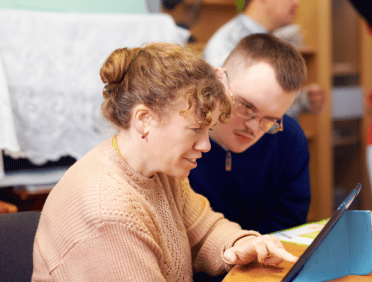Safeguarding The Rights for Adults with Disabilities
Adults with disabilities emerge as a group in need of sophisticated safeguards to ensure their safety and rights in the complex tapestry of protecting vulnerable populations. We will go deeper into the multifaceted world of safeguarding adults with disabilities in the UK, examining specific difficulties and delving into legal frameworks. Investigate accessible environments, as well as fostering community engagement and activism and emphasising educational programmes.
Examining technology as a facilitator, highlighting the value of supportive networks, and outlining the obstacles and future directions for sustained proactivity.
Understanding the Unique Challenges
Adults with impairments encounter problems that go beyond the obvious physical obstacles. Addressing concerns such as accessibility, communication limitations, and the possibility of prejudice are all part of ensuring their safety. Furthermore, the interplay of disability, gender, race, and socioeconomic position presents unique issues that necessitate customised solutions. Women with disabilities, for example, may experience different safety issues than men, necessitating gender-sensitive methods in safeguarding regulations.
Legal Frameworks and Protections
The United Kingdom has made tremendous progress towards establishing a strong legal framework to protect the rights of people with disabilities. The Equality Act of 2010, for example, is a cornerstone in preventing discrimination. However, the efficiency of these regulations must be constantly assessed and improved. A critical examination of their implementation and the identification of inadequacies are key stages in bolstering legislative systems to safeguard adults with disabilities.
Key Legislation and Regulation for Adults with Disabilities
Adults with disabilities are protected in the United Kingdom by a robust legal framework that protects their rights and ensures their safety. A number of significant pieces of legislation and regulations lay the groundwork for safe practises in this environment.
Understanding and complying to these major pieces of legislation and regulations is critical for professionals and organisations in the UK involved in the protection of persons with disabilities. Adherence to these legislative frameworks promotes a rights-based approach and contributes to the creation of a safe and inclusive environment for people with disabilities. It is also critical to stay up to date on any revisions or amendments to these regulations in order to maintain good safeguarding practises.
Equality Act 2010
The Equality Act of 2010 is a major piece of legislation that consolidates, updates, and expands earlier anti-discrimination legislation. It forbids discrimination and encourages equal opportunities for people with disabilities in a variety of areas, including employment, education, and access to products and services.
Mental Capacity Act 2005
The Mental Capacity Act 2005 establishes a legal framework for making decisions on behalf of people who lack the mental capacity to make their own. It establishes the concepts and methods for evaluating capacity, as well as the legal authority to make choices in the best interests of those who lack capacity.
Care Act 2014
The Care Act of 2014 focuses on the well-being of people who require care and support, particularly those with disabilities. It imposes an obligation on local governments to promote individuals’ dignity and independence, and it establishes the legal framework for assessing and providing the care and support requirements of adults.
Human Rights Act 1998
The European Convention on Human Rights is incorporated into UK law by the Human Rights Act. It safeguards individuals’ fundamental rights and liberties, such as the right to life, the prohibition of torture, and the right to privacy and family life. These rights are especially important in protecting adults with disabilities.
Safeguarding Vulnerable Groups Act 2006
The Safeguarding Vulnerable Groups Act strives to protect vulnerable individuals, especially those with impairments, by regulating those who work with children and vulnerable adults. It established the Disclosure and Barring Service (DBS) to undertake criminal record checks on persons and ensures that those with a history of harm are not permitted to work with vulnerable populations.
Health and Social Care Act 2008 (Regulated Activities) Regulations 2014
The Health and Social Care Act 2008 (Regulated Activities) Regulations 2014 establish the essential requirements that health and social care providers must follow in order to ensure the safety and well-being of those receiving care. The regulations address a variety of issues, such as person-centered care, decency, and respect for individuals’ privacy.
Children Act 1989 and Children Act 2004
While primarily concerned with the welfare and protection of children, the Children Act 1989 and Children Act 2004 are critical in the context of protecting persons with disabilities, particularly those who may have moved from child to adult services. The acts emphasise the necessity of collaboration across agencies in promoting the welfare of children and youth.
The Mental Health Act 1983
The Mental Health Act 1983 legislation establishes the legal basis for the detention, assessment, and treatment of people suffering from mental illnesses. While not particular to impairments, it is significant when examining the interconnectedness of mental health and disabilities, ensuring appropriate safeguards for those with dual diagnoses.
Promoting Accessible Environments
Providing physically and socially accessible environments is critical to ensure the safety and well-being of persons with disabilities. Aside from legal requirements, there is a rising awareness of the necessity for universal design principles. Examples of successful inclusive design and infrastructure, such as wheelchair-accessible public spaces and adaptive technology, demonstrate the positive impact of putting safety and accessibility first.
Community Engagement and Advocacy
Communities can help to create an inclusive and supportive environment for persons with disabilities. Aside from legal measures, community engagement can be a valuable instrument for building awareness and dispelling stigmas. Successful advocacy projects, such as those conducted by disability rights organisations and local community organisations, demonstrate the transformative power of collective action in advocating beneficial policy and practise changes.
Educational Initiatives
Education emerges as a critical component of the safeguarding journey. Raising awareness about the rights and safety concerns of adults with disabilities is critical to creating an informed and compassionate society. Educational programmes ranging from inclusive curricula in schools to workplace awareness initiatives have proven beneficial in increasing understanding and inclusivity. Furthermore, continuing education for professionals in fields such as healthcare and law enforcement is critical to assuring an educated and responsive workforce.
Technology as an Enabler
Technology in the digital age provides unparalleled opportunity to improve the safety and autonomy of persons with disabilities. Screen readers and mobility aids are examples of assistive technology that empower people by removing obstacles to communication and access. The use of smart home technology leads to the creation of a more inclusive and secure environment, providing persons with disabilities greater independence.
Building Supportive Networks
Family, friends, and community organisations form an important pillar in guaranteeing the safety and rights of adults with disabilities. In addition to institutional support structures, informal networks play an important role in people’s well-being. In order to strengthen these networks, an environment of understanding, empathy, and practical support must be created. Initiatives to provide respite care for carers and to build mentorship programmes within the disability community are among the recommendations.
Challenges and Future Directions
While progress has been made in ensuring the safety and rights of adults with disabilities, persisting difficulties necessitate continued attention. Service shortages, a lack of understanding in specific areas, and attitudinal hurdles all demand focused solutions. Furthermore, future research, policy, and advocacy should prioritise the amplification of varied perspectives within the disability community, ensuring that solutions developed are inclusive and responsive to individuals’ particular needs.
Key Takeaways: Safeguarding Adults with Disabilities in the UK
Adults with impairments in the United Kingdom require a comprehensive, ever-evolving strategy. Understanding their particular issues, establishing legal frameworks, boosting accessibility, encouraging community engagement and advocacy, championing educational programmes, utilising technology, and creating supportive networks can all help.
Legal Foundation
Adults with disabilities in the United Kingdom are protected by a strong legal framework that includes significant legislation such as the Equality Act of 2010, the Mental Capacity Act 2005, and the Care Act of 2014.
Anti-Discrimination Measures
The Equality Act of 2010 is critical in preventing discrimination and encouraging equal opportunities for people with disabilities in all sectors of life, fostering inclusion.
Decision-Making Support
The Mental Capacity Act 2005 outlines principles and procedures for making decisions on behalf of people who lack mental ability, ensuring that their best interests are regarded in a legally defined manner.
Well-Being Focus
The Care Act of 2014 prioritises the well-being of individuals, including those with disabilities, and requires local governments to assess and satisfy their care and support needs.
Human Rights Protection
The Human Rights Act of 1998 integrates the European Convention on Human Rights, protecting essential rights important for adults with disabilities, such as the right to life and the right to privacy and family life.
Disclosure and Barring Service (DBS)
The DBS is established under the Safeguarding Vulnerable Groups Act of 2006, which ensures that individuals with a history of violence are barred from working with vulnerable groups, including adults with disabilities.
Regulated Activities Standards
The Health and Social Care Act 2008 (Regulated Activities) Regulations 2014 establishes core requirements for health and social care providers, including features such as person-centered care and privacy protection.
Transition from Child to Adult Services
While primarily aimed at children, the Children Act 1989 and Children Act 2004 are critical in protecting persons with disabilities who may have migrated from child to adult care, emphasising collaboration among agencies.
Mental Health Considerations
While not specific to impairments, the Mental Health Act 1983 is useful in examining the interconnectedness of mental health and disabilities, guaranteeing proper safeguards for those with dual diagnoses.
Continuous Compliance and Awareness
Professionals and organisations concerned in the protection of adults with disabilities must be informed about revisions or amendments to these laws in order to ensure continued compliance, effective safeguarding practises, and the construction of a secure and inclusive environment.
Safeguarding Adults Training
- The Safeguarding Adults Level 1 course (£25) offered by Learn Q in the UK covers several key areas crucial for the protection of vulnerable adults. Participants will learn about the concept of safeguarding vulnerable adults, the importance of safeguarding, relevant legislation, recognising signs of abuse, responding to disclosures of abuse or neglect, and reporting safeguarding concerns while maintaining confidentiality.
- The Safeguarding Adults Level 2 course (£28) at Learn Q is designed for individuals with additional safeguarding responsibilities, particularly those working in settings like hospitals, general practices, nursing homes, care homes, domiciliary care, religious organisations, and community organisations. It is ideal for seasoned team members who have already completed introductory Level 1 training. The course content includes understanding the concept of safeguarding vulnerable adults, the importance of safeguarding, relevant legislation, signs of abuse, responding to abuse or neglect disclosures, reporting safeguarding concerns, maintaining confidentiality, understanding workplace safeguarding roles and responsibilities, multi-agency working, and effective communication skills
- Learn Q’s Preventing Radicalisation course is designed to help frontline sectors to be aware of how to prevent radicalism and extremism. Especially for individuals who have contact with adults who may be vulnerable. It raises awareness of the signs and techniques of radicalisation so that you can provide support and guidance to individuals in need as well as save their lives if you can identify these signs.
You can get further savings by purchasing one of Learn Qs money saving bundles, such as:
These courses are ideal for those who work in hospitals, general practices, nursing homes, care homes, domiciliary care, as well as in religious and community organisations. By completing this course, you will be better equipped to handle safeguarding concerns and to ensure the safety and well-being of vulnerable adults.
At Learn Q, we are committed to providing high-quality training that meets the needs of professionals across a range of industries. Our Safeguarding Children courses are designed to provide you with the knowledge and skills you need to excel in your role and make a real difference in the lives of vulnerable children. Sign up today and take the next step in your career!












